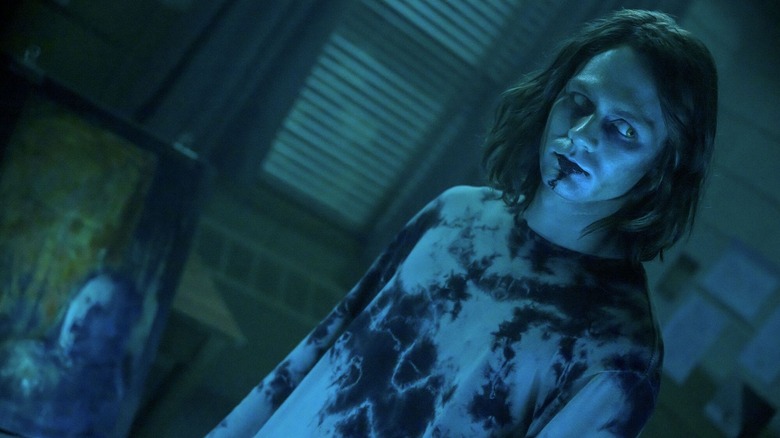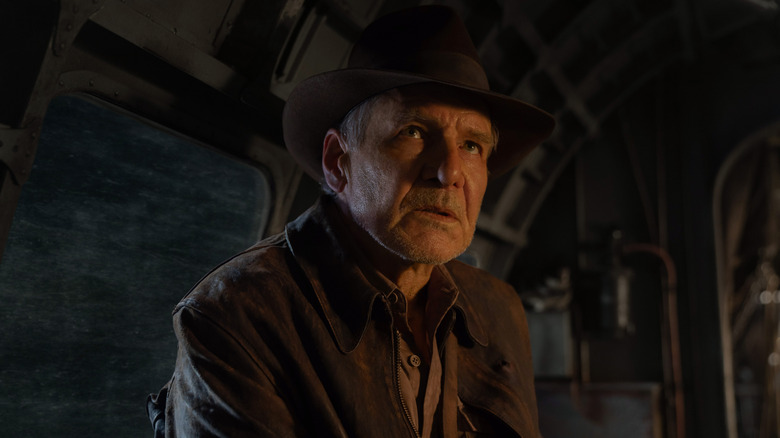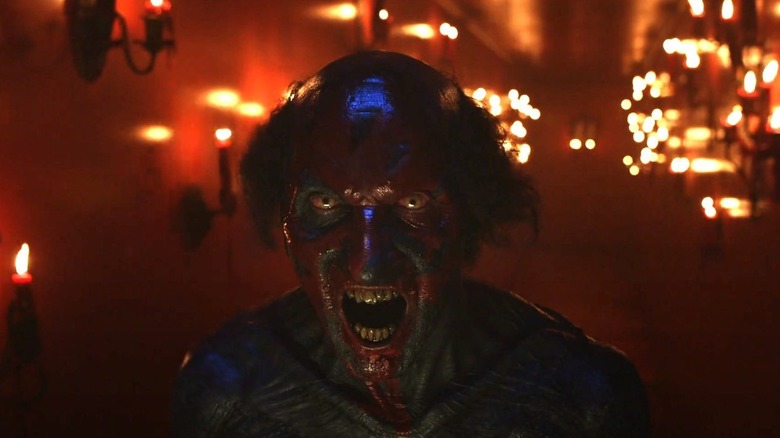Insidious 5 Defeated Indiana Jones At The Box Office – But Will Hollywood Learn The Right Lesson?
One probably wouldn't have looked at this past weekend on the calendar earlier in the year and saw it as a particularly interesting box office battle. Sony was releasing "Insidious: The Red Door" as obvious counter-programming to "Indiana Jones and the Dial of Destiny" in its second weekend. Yet, it became a much bigger battle than anyone could have anticipated. Most crucially, the low-budget horror film actually came out on top, as opposed to the mega-budget, nostalgic franchise flick. It now serves as an indicator of where the industry is at this moment, for better or worse.
"The Red Door" absolutely obliterated expectations taking in $32.65 million, per The Numbers, taking the number one spot on the chart for the weekend. "Dial of Destiny," meanwhile, had to settle for second with $26.5 million. Internationally is where things get even more interesting with the fifth entry in the "Insidious" franchise earning $31.4 million, virtually tied with "Indiana Jones 5," which pulled in $31.8 million overseas. That leaves us with much to discuss.
Sony's horror film, which was directed by star Patrick Wilson, debuted at $64.4 million worldwide against a mere $16 million budget. Yes, that's a heck of a lot more expensive than the original "Insidious," which was made for a mere $1.5 million and made just shy of $100 million at the box office. But even if "The Red Door" never made another dime, it would probably be considered a win. And yet, it's probably going to do reasonably well in the weeks ahead and should easily cross $100 million before all's said and done — if not much more. Sony will end up making money on this one, and probably a lot of it.
As always, it's all relative
Meanwhile, Disney and Lucasfilm are kind of in damage control mode. As of this writing, director James Mangold's entry in the "Indiana Jones" series has earned $247.9 million worldwide. It's not a great number for most blockbusters through two weekends, but as we've discussed in the past, this movie comes with a dizzying production budget in the $300 million range (before marketing). Disney has precisely no hope of turning a profit with this one in theaters, and it will be a real stretch to imagine that VOD, Blu-ray, and merchandising can justify the cost down the line.
This is where it's important to circle back to the age-old concept that drives the movie business: it's all relative. A lower-budget movie doesn't need to fill nearly as many seats to become a success. A blockbuster film, on the other hand, needs far more people to turn up to justify the cost. But when that works out, the rewards can be massive. Just look at "The Super Mario Bros. Movie," which is now one of the highest-grossing movies of all time. But a movie that accomplished that feat with a far more reasonable $100 million budget, it's worth adding.
The point is, Disney and other studios have been vastly overestimating the audience size for franchise films in the post-pandemic era, relative to the cost of the film. "Transformers: Rise of the Beasts" and "The Flash" ran into a similar issue, for example. Studios and theaters alike need big franchise films, but if these films lose millions of dollars, things start to get dicey real quick.
More smaller movies (and not just horror)
Now, as we've seen over the past couple of years, horror is having quite the moment at the box office. "The Black Phone," "Smile," "M3GAN," "The Pope's Exorcist," and "Barbarian," among others, all made a lot of money relative to their cost. "Insidious: The Red Door" now joins that club, which means every studio is probably just going to try and make more horror movies. And sure, that's not a terrible idea, so long as everyone doesn't overdo it and flood the market. Too much of a good thing can spoil it.
The bigger lesson here (and I am certainly not the first person to argue this as of late) is that studios should probably make slightly fewer massive-budget tentpoles, and invest in more low-to-mid budget films. Yes, you will suffer some misses, just as Lionsgate did this weekend with the raunchy comedy "Joy Ride." That said, Lionsgate will still probably, in the end, manage to break even with the film. Or, at the very least, the losses will be sustainable and they get a critically acclaimed title for their library. Warner Bros., meanwhile, is going to lose somewhere in the neighborhood of $200 million on "The Flash." That's ruinous.
On the flip side, when one of these smaller movies pops off, a studio can truly reap the rewards for years to come. Just look what happened with "Knives Out" or "John Wick." So yes, absolutely make more horror movies, but Hollywood, on the whole, should also consider strongly the notion of relocating resources to make smaller movies. In the process, they'll make the slightly fewer blockbusters that hit theaters every year feel more special.


